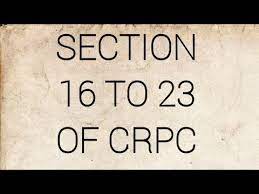Section 16 of CrPC, 1973 provides for the establishment of courts of Metropolitan Magistrates in metropolitan areas. It states that:
“(1) In every metropolitan area, there shall be established as many Courts of Metropolitan Magistrates, and at such places, as the State Government may, after consultation with the High Court, by notification, specify.
(2) The presiding officers of such Courts shall be appointed by the High Court.”
A metropolitan area is an urban area with a population of more than 1 million people. Section 16 of CrPC gives the State Government the power to establish as many courts of Metropolitan Magistrates as it deems necessary, after consultation with the High Court. The presiding officers of these courts are appointed by the High Court.
The jurisdiction of a Metropolitan Magistrate extends to the entire metropolitan area in which the court is situated. Metropolitan Magistrates have the power to try all offenses under the Indian Penal Code (IPC), except for offenses punishable with death or life imprisonment. They also have the power to try all offenses under other special and local laws, unless the law specifically states otherwise.
Metropolitan Magistrates play an important role in the criminal justice system. They are responsible for trying a large number of cases, including petty offenses, serious offenses, and cases against juveniles.
Here are some of the advantages of having separate courts of Metropolitan Magistrates:
- It helps to reduce the workload on other courts, such as the District Courts and the High Courts.
- It ensures that cases are tried more quickly and efficiently.
- It provides specialized expertise in the handling of criminal cases.
- It makes the criminal justice system more accessible to people living in metropolitan areas.
However, there are also some challenges associated with the functioning of courts of Metropolitan Magistrates. One challenge is that there is often a shortage of judges in these courts. This can lead to delays in the trial of cases. Another challenge is that Metropolitan Magistrates are often overburdened with work. This can make it difficult for them to give each case the attention it deserves.
Despite these challenges, courts of Metropolitan Magistrates play an important role in the criminal justice system. They help to ensure that justice is delivered to people in a timely and efficient manner.
Here are some important case laws on Section 16 of CrPC, 1973:
State of Uttar Pradesh v. Mohd. Ishaq (1995) 4 SCC 103
In this case, the Supreme Court held that a Metropolitan Magistrate has the power to try all offenses under the IPC, except for offenses punishable with death or life imprisonment. This power is not limited to offenses that are committed within the metropolitan area.
Rajendra Singh v. State of Madhya Pradesh (2004) 10 SCC 361
In this case, the Supreme Court held that a Metropolitan Magistrate has the power to try offenses under special and local laws, unless the law specifically states otherwise. For example, a Metropolitan Magistrate has the power to try offenses under the Narcotics Drugs and Psychotropic Substances Act, 1985, even though the Act does not specifically mention Metropolitan Magistrates.
K.P.S. Gill v. State of Punjab and Others (2001) 6 SCC 329
In this case, the Supreme Court held that the State Government cannot establish a court of Metropolitan Magistrate without first consulting with the High Court. The Supreme Court also held that the State Government cannot transfer a case from a District Court to a court of Metropolitan Magistrate without the permission of the High Court.
State of Haryana v. Chander Pal (1994) 1 SCC 721
In this case, the Supreme Court held that a Metropolitan Magistrate has the power to issue search warrants, arrest warrants, and other warrants throughout the metropolitan area in which the court is situated.
State of Uttar Pradesh v. Mohd. Sharif (1996) 1 SCC 718
In this case, the Supreme Court held that a Metropolitan Magistrate has the power to grant bail in all cases, except for cases where the accused is charged with an offense punishable with death or life imprisonment.
These are just a few examples of important case laws on Section 16 of the CrPC. These case laws have helped to clarify the powers and jurisdiction of Metropolitan Magistrates. They have also helped to ensure that the criminal justice system is fair and efficient.

